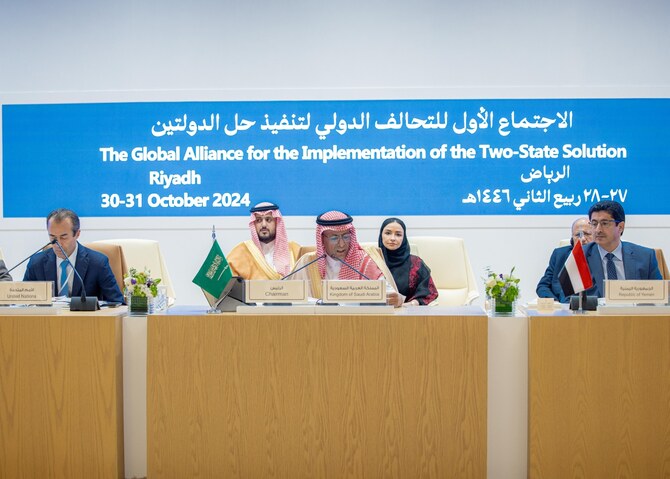
- ARAB NEWS
- 05 Jul 2025

Riyadh last week hosted the first meeting of the Global Alliance for the Implementation of the Two-State Solution. The alliance was launched in September in New York on the sidelines of the UN General Assembly’s 79th session. Saudi Arabia and Norway, together with the EU and the Arab League, were the main backers at the time, but many more have since expressed support and an interest in making it happen.
Saudi Arabian Foreign Minister Prince Faisal bin Farhan opened the Riyadh deliberations on Oct. 30, with more than 90 countries and governmental organizations in attendance. He stressed the importance of intensifying efforts to make the two-state solution a reality and reiterated the Kingdom and its partners’ commitment to attaining peace “through practical steps and specific timetables aimed at ending the occupation and realizing the independent Palestinian state.”
He called for an immediate ceasefire, pointing out that the escalation and expansion of the conflict are undermining the chances for a two-state solution and increasing regional instability. He voiced grave concern over the deteriorating humanitarian situation in Gaza and expressed strong support for UNRWA to help it deal with these unprecedented challenges.
Speaker after speaker echoed those remarks. While the meeting’s focus was meant to be the two-state solution, the catastrophic conditions in Gaza dominated the remarks of many delegates. Their concerns were heightened by Israel’s measure, taken two days earlier, to ban UNRWA, whose chief Philippe Lazzarini took part in the meeting.
While the meeting’s focus was meant to be the two-state solution, Gaza dominated the remarks of many delegates
Dr. Abdel Aziz Aluwaisheg
There was a clear universal consensus on the two-state solution and the right of self-determination for the Palestinians. The particular parameters for this solution, including the Arab Peace Initiative, were also agreed by an overwhelming global majority beyond the alliance, including by countries considered to be allies or very close friends of Israel, such as the US, UK and Germany.
There was also a clear consensus on what needs to be done over the coming weeks and months to move the work of the global alliance forward, including putting together an action plan with clear steps and timetables.
However, given the monumental tasks before the Global Alliance for the Implementation of the Two-State Solution, a division of labor is clearly needed. The humanitarian situation in Gaza needs immediate attention to stop Israel’s genocidal actions and alleviate the near-famine conditions there. It is therefore important to establish a separate track to deal with this rapidly deteriorating situation, including continuing efforts to reach agreement on a ceasefire and exchange of hostages, detainees and prisoners.
The humanitarian track should also focus on improving humanitarian access and the delivery of aid, both of which are hampered by Israeli actions, including its measures against UNRWA. An immediate issue of concern is the protection of humanitarian workers to enable aid organizations to carry out their activities. The sincere sentiments expressed at the Riyadh meeting in support of this need to be translated into tangible diplomatic and financial steps to enable aid organizations to fulfill their mandates. Some participants proposed a UN-supervised cross-border mechanism to deliver aid akin to what is done between Syria and Turkiye to improve access and aid delivery.
The second track should focus on economic issues, such as developing proposals to strengthen the Palestinian economy, improve living conditions for Palestinians and provide economic opportunities. Its work should also include improving governance by working with the Palestinian Authority and donors to strengthen state institutions and improve the delivery of basic services.
In just one month, more than 90 countries and organizations have joined and many more have expressed support
Dr. Abdel Aziz Aluwaisheg
More immediately, this track should also focus on the stabilization, recovery and resilience of the Gaza Strip and removing Israeli restrictions on economic activity in the West Bank.
The third track should deal with the political and security requisites of the Palestinian state. There are successful examples, such as Kosovo and Namibia, where the international community, including the UN and NATO, were able to provide the security support needed in such situations. These requirements include the protection of civilians in Gaza and the West Bank and the security arrangements needed to replace Israeli forces in the Occupied Territories. This track should also include Gaza-West Bank reunification arrangements.
Within each track, it would be useful to establish specialized working groups, where needed, to bring in specialized talent and input. One common objective of each of the working groups should be to coordinate the current efforts undertaken by many parties and build on what has already been done. These small working groups will be able to move relatively quickly and develop proposals for the larger group to adopt, while avoiding being slowed down or overwhelmed by a particular issue.
The alliance has great potential and its collective work is important to keep effective overall oversight and make sure it achieves its intended goals. In just one month, more than 90 countries and intergovernmental organizations have joined and many more have expressed support. The alliance already represents about half of the UN’s membership and has the potential to grow further.
With the expanded membership, it would be useful to establish a steering committee to help the alliance organize its activities and oversee the work of its separate components along the three tracks and maintain the consensus and cohesion of the alliance, while avoiding divisive issues.